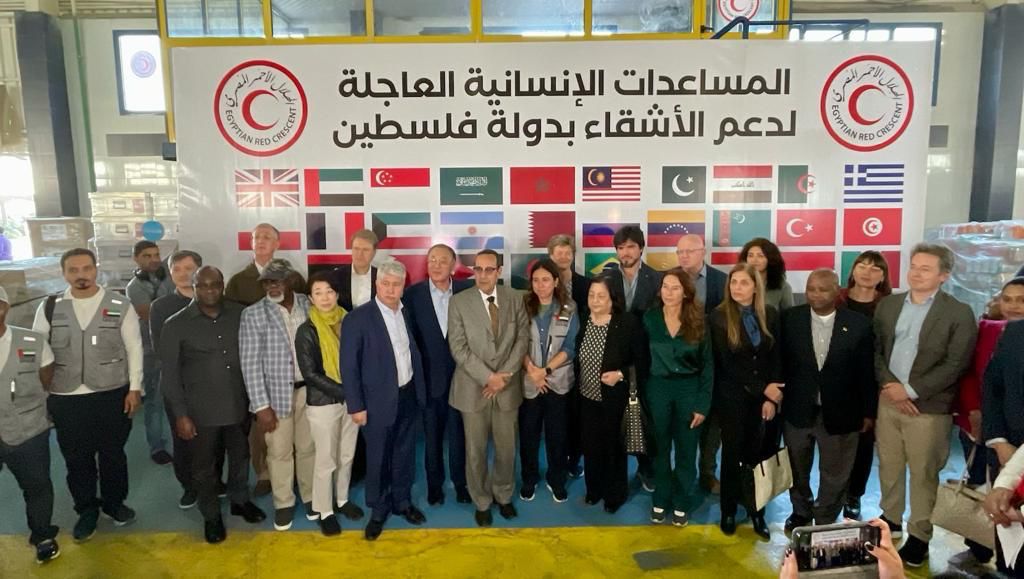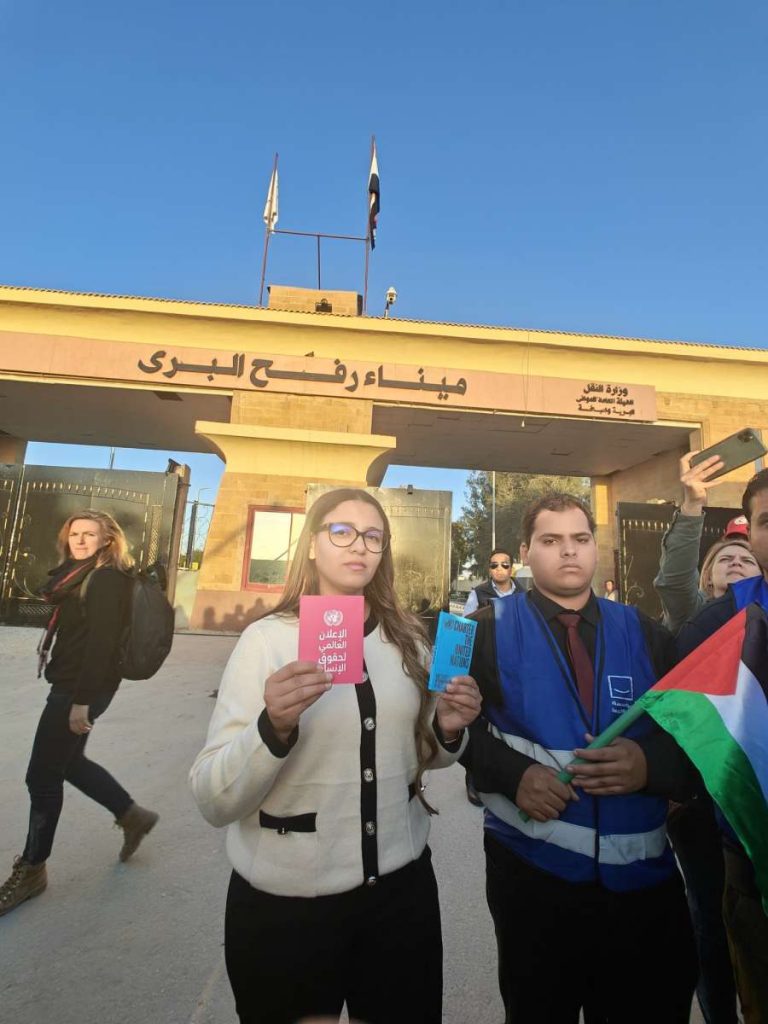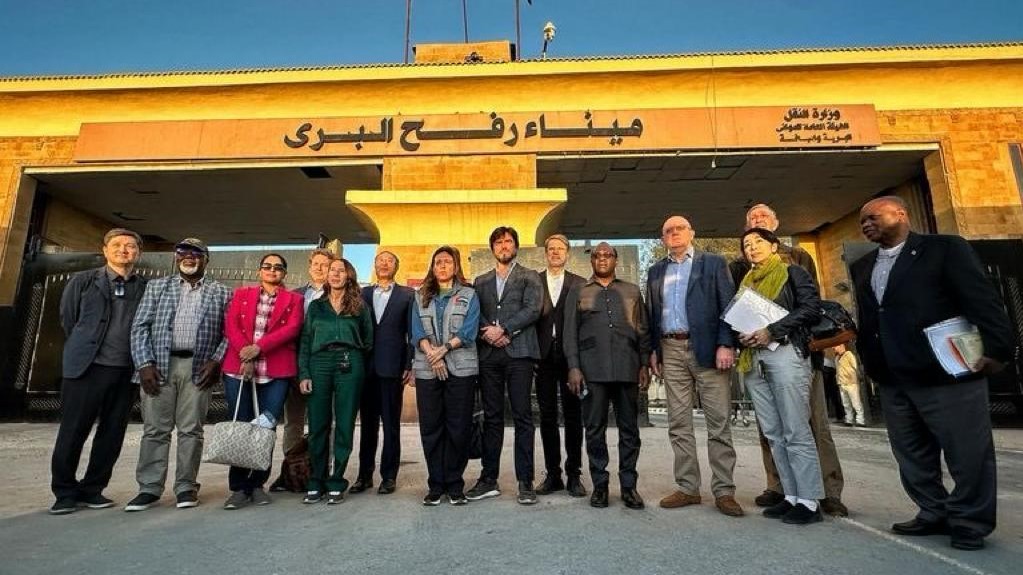The United Nations Security Council delegation, consisting of twelve ambassadors, embarked on the visit to Rafah crossing organised by the United Arab Emirates (UAE).
United Nations Security Council envoys visited the Egyptian side of the Rafah border crossing on Monday, expressing deep concern over the dire situation in the Gaza Strip and calling for an immediate end to the conflict. The Rafah crossing serves as the primary entry point for aid to the besieged Palestinian enclave.
Zhang Jun, China’s representative to the UN, succinctly conveyed a message to nations opposing a Gaza cease-fire: “Enough is enough.”
The majority of UN member states advocate for a swift and enduring cessation of hostilities between Israel and Hamas. The Security Council delegation, consisting of twelve envoys, embarked on the visit organised by the United Arab Emirates. This trip followed UN Secretary-General Antonio Guterres’ recent warning that thousands in Gaza were “simply starving.”
Arriving in Al-Arish, the envoys received briefings from the UN Palestinian refugee agency UNRWA on the deteriorating conditions in Gaza before proceeding to Rafah, approximately 30 miles away.
Lana Nusseibeh, the UAE’s permanent representative to the UN, highlighted the alarming situation conveyed during the briefings. Palestinians in Gaza are reportedly facing malnutrition, a collapsing medical system, water and food shortages, in addition to the ongoing conflict. The envoys emphasised the urgent need for concerted international efforts to address the humanitarian crisis and bring about a lasting resolution to the conflict.

UNGA to Convene on Gaza
The emergency session of the United Nations General Assembly (UNGA) on the situation in Gaza is set to resume on Tuesday, as announced by UNGA President Dennis Francis, CNN reported.
This decision follows the United States’ veto of a UN Security Council resolution on Friday, which had called for a humanitarian ceasefire.
In a letter penned to the 193 UN member states, UNGA President Dennis Francis conveyed that representatives from Egypt and Mauritania, acting as the Chairs of the Arab Group and Organisation for Islamic Cooperation (OIC) Group, respectively, had called for the special meeting on Tuesday, according to CNN.
They invoked UNGA resolution 377, known as “United for Peace,” which empowers the General Assembly to convene when the Security Council “fails to exercise its primary responsibility to act as required to maintain international peace and security.”
The joint letter from the representatives emphasised the urgency of the situation, stating, “In the absence of a ceasefire and in light of the ongoing grave breaches of international law, including humanitarian and human rights law, and violations of the relevant United Nations resolutions… the situation in the Occupied Palestinian Territory, including East Jerusalem, particularly in the Gaza Strip, has continued to dramatically deteriorate.”

The emergency session is scheduled to begin at 3 pm ET on Tuesday, according to UNGA President Dennis Francis.
The US had exercised its veto power to block a UN resolution that called for an immediate ceasefire in Gaza. The draft resolution, presented by the United Arab Emirates, had proposed “an immediate humanitarian ceasefire,” the release of all hostages, and ensuring humanitarian access. Thirteen countries supported the resolution, the US vetoed it, and the United Kingdom abstained.
Following this, Palestinian President Mahmoud Abbas accused the United States of being “responsible” for the bloodshed of children in Gaza after Washington vetoed a UN resolution calling for an ‘immediate ceasefire’, Times of Israel reported.”
He described the American position as aggressive and immoral, a flagrant violation of all humanitarian principles and values, and held the US responsible for the bloodshed of Palestinian children, women and elderly people in the Gaza Strip,” a statement from President Abbas’s office read.
This move came after UN Secretary-General Antonio Guterres invoked Article 99 of the UN charter, an unusual step that allowed him to call a Security Council meeting on an “issue that may aggravate existing threats to the maintenance of international peace and security.” Notably, this powerful tool had not been used since 1989, CNN reported. (with inputs from ANI)
ALSO READ: Israel bombards Gaza, including evacuation areas for Palestinians

